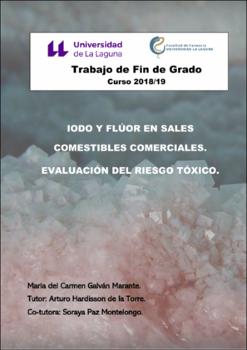Iodo y flúor en sales comestibles comerciales. Evaluación del riesgo tóxico.
Fecha
2019Resumen
tirosina quinasas, inhibidores de tirosina quinasas, cáncer, aplicaciones
terapéuticas. Salt is an indispensable seasoning in the Mediterranean diet, so its
supplementation with iodine and fluoride is completely logical. This study assesses the
levels of these elements in 30 samples of major commercial salts to determine the
potential toxic risk arising from their consumption, as well as their correspondence with
the values declared on the label.
The concentrations obtained for fluorinated salts do not pose a risk, in fact, the
levels of this ion are much lower than those referred to in the product labelling. On the
other hand, in the case of iodized salts, the levels are similar to those declared on the
packaging, posing a risk to the most vulnerable age groups. ChanteSel® salt stands
where levels reach the maximum value (0,08 mg I/g salt).
In conclusion, fluoridated salt consumption does not pose a risk under normal
conditions, while consumption of iodized salt could be, especially for children and
adolescents whose requirements are lower.





